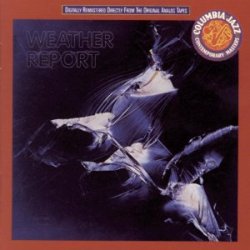Weather Report – Weather Report (1971)
Weather Report – Weather Report (1971)

01. Milky Way (Wayne Shorter, Joe Zawinul) – 2:29 play 02. Umbrellas (Shorter, Miroslav Vitous, Zawinul) – 3:24 03. Seventh Arrow (Vitous) – 5:19 04. Orange Lady (Zawinul) – 8:40 05. Morning Lake (Vitous) – 4:22 06. Waterfall (Zawinul) – 6:16 07. Tears (Shorter) – 3:22 play 08. Eurydice (Shorter) – 5:41 Personnel: - Joe Zawinul - electric and acoustic piano - Wayne Shorter - soprano saxophone - Miroslav Vitous - electric and acoustic bass - Alphonse Mouzon - drums, voice - Airto Moreira – percussion
Weather Report's 1971 debut album defined the spirit of fusion - restlessly creative, eager to explore new sonic landscapes, and aware that there was a new audience out there eager to share in the discoveries. It's no accident that four of the five original band members - keyboardist Joe Zawinul, saxophonist Wayne Shorter, bassist Miroslav Vitous, and percussionist Airto Moriera - had played with the godfather of fusion, Miles Davis. Drummer Alphonse Mouzon brought a tireless propulsive force into the mix. The short, densely-written pieces on this record were like blueprints for a band that would expand on them in live performance. ---John Swenson, Amazon.com
Wayne Shorter and Joe Zawinul left the Miles Davis fold to start their own group, soon to be known as Weather Report. This is their debut album with bassist Miroslav Vitous, drummer Alphonse Mouzon, and percussionist Airto Moreira. With so many of the musicians coming out of Miles's early electric period, one would expect more of the same funk and fire coming out of the trumpeter's recordings and performances at the time, especially since Shorter and Zawinul were probably the two most prominent in terms of shaping Miles's music compositionally. But instead of the spontaneous energy and rawness of Davis's electric music (which is definitely an acquired taste), this album delivers more of a studio production, although not to the level that their subsequent recordings would. The different tunes are more like sketches than long funky jams, though they do continue the tradition of electronic sounds. They explore new sonic territories in a relatively laid-back fashion, and thus the result is like "In A Silent Way" or even more like "Filles de Kilimanjaro" than "Bitches Brew" or anything Miles was doing at this point. But this album takes it a step farther, like on "Milky Way," the product of recording echos from an acoustic piano that form a remarkably coherent yet far-out piece of music.
When this album was first released, it was critically acclaimed to be brilliant (Shorter and Zawinul are two of jazz's greatest geniuses) but somewhat cold in comparison to Miles's recordings on which the present leaders had played. That criticism stands up today; I listen to this album once in a while when I'm in a strange mood and find myself very interested in the experiments but not particularly emotionally affected. The exception I can think of is "Tears," with its beautiful melodic fragment and passionate development.
Weather Report would continue in this vein for one more album, "I Sing The Body Electric," with what I feel are more successful results (see my review for that album) before changing tracks and becoming one of the most commercially successful fusion bands of the 70s. That music is wonderful too but this is quite different than "Heavy Weather" or "Black Market." Still, there is nothing particularly overt or offensively dissonant to the casual listener, so it is a listenable introduction to the band, if not the best. This album will truly appeal only to adventurous jazz listeners or anyone who wants to hear some "tripped out stuff" and anyone else might feel disengaged from this music. But if you can pay attention to it long enough to appreciate its depth, you will hear how nobody else ever did anything like this, which in and of itself is exciting and worthwhile. --- Michael Hardin
Weather Report – amerykańska, jazzowa grupa muzyczna, grająca muzykę w stylu fusion. Działała w latach 70. i 80. XX wieku.
Powstała z inicjatywy muzyków grupy Milesa Davisa, która nagrała na przełomie lat 60. i 70. dwa przełomowe dla jazzu albumy, "In a Silent Way" i "Bitches Brew". Stałe jądro zespołu stanowił duet Joe Zawinul (fortepian) i Wayne Shorter (saksofon). Członkami zakładającymi zespół w roku 1971 oprócz Joego Zawinula i Wayne’a Shortera byli Miroslav Vitous (gitara basowa), Alphonse Mouzon (perkusja) oraz Airto Moreira (instrumenty perkusyjne). Początkowo grupa ta była formacją eksperymentalno-rytmiczną, stając się później absolutnym kanonem muzyki fusion.
W roku 1976 do zespołu dołączył basista Jaco Pastorius. Grupa stała się bardziej melodyjna i zdobyła masowy rynek. Najbardziej znany utwór zespołu Weather Report nosi tytuł Birdland.
download (mp3 @320 kbs):
uploaded yandex 4shared mega mediafire solidfiles zalivalka cloudmailru oboom
Last Updated (Saturday, 20 June 2015 22:02)








